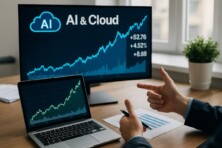Morgan Stanley is expanding the practice of using artificial intelligence tools powered by OpenAI technology in its investment banking and trading unit.

Katy Huberty, the mentioned bank’s global director of research, said that this financial institution, which launched a virtual assistant with machine intelligence for its wealth management advisors early last year, began adopting another version of a digital product called AskResearchGPT in its group of institutional securities in the summer of 2024. It is worth noting that a kind of technological core of the corresponding functional solutions is ChatGPT, the world’s most popular chatbot based on artificial intelligence, which debuted in 2022 and was developed by OpenAI specialists.
A new machine intelligence tool allows users to extract answers from the entire list of research conducted by a financial institution. In this case, among other things, information materials related to stocks, commodities, regions, and industry trends are meant. It is worth noting that the practice of using an artificial intelligence tool actually eliminates the need to solve the task of gleaning insights from more than 70,000 reports that are produced annually by a financial institution. The corresponding task is very time-consuming when performed manually.
Katy Huberty stated that the bank perceives the artificial intelligence tool as a game changer in terms of productivity for its research analysts and colleagues in the institutional securities sector. Also, in this case, it was separately noted that the appropriate tool helps employees access the highest quality and most insightful information as effectively as possible.
OpenAI’s generative artificial intelligence technology, immediately after its debut in 2022, demonstrated cognitive abilities that impressed consumers. This technology is capable of processing and analyzing massive amounts of information. Moreover, the corresponding virtual product copes with the tasks associated with generating original content in various categories. This technology from OpenAI was swiftly adopted by the largest Wall Street players.
Morgan Stanley said that almost half of its 80,000 employees use artificial intelligence tools. In this case, it means the corresponding digital products developed by OpenAI. At the same time, at rival bank JPMorgan Chase, about 60% of 316,043 employees have access to a virtual platform using artificial intelligence models from the ChatGPT developer. The relevant information was published by the media, referring to an insider who used the right of anonymity because in this case an issue related to the category of confidential is implied.
Currently, OpenAI is one of the main players in the artificial intelligence market, where recently there has been a tendency of consistently increased competition. The market capitalization of this San Francisco-based company is around $157 billion.
Pierre Buhler, a banking consultant with SSA & Co., said that OpenAI already has significant network advantages in the financial services sector. It was noted that in this case, the factors contributing to the formation of an appropriate position are ample funding and early focus on cases of using artificial intelligence within the framework of banks’ activities.
Pierre Buhler also stated that OpenAI is ahead of other industry players in terms of market penetration. At the same time, the expert noted that the mentioned market is still emerging. Besides, Pierre Buhler stated that it is likely that OpenAI’s competitors like Anthropic will gain use over time.
It is worth noting that market dominance is not a permanent condition, although it could potentially be that one. In this case, the implication is that the status of an industry leader is both in terms of financial performance and in the context of what can be described in a generalized sense as technological results, not lifelong. The continuation of market dominance depends on the level of competitiveness of the company. Competition is intensifying in the artificial intelligence industry and is likely to continue movement on an upward trajectory, as AI is still developing, overcoming new horizons of evolution, and contains significant potential that has not been fully realized. OpenAI has so far managed to hold a leading position in the machine intelligence market. The company develops new products for different categories of consumers. At the same time, the pressure on OpenAI’s market position from competitors will increase. Potentially, the company can cope with this challenge. However, in a practical sense, a favorable scenario is not guaranteed, although it is not impossible or minimal from the point of view of realism.
Morgan Stanley is currently one of the leaders in the area of global investment banking and trading. JPMorgan and Goldman Sachs are also major players in the mentioned sector.
Katy Huberty said that Morgan Stanley employees have gravitated toward AskResearchGPT. They use the appropriate machine intelligence tool instead of getting on the phone or lobbing an email to the research department. As part of the interaction with this virtual product, employees of a financial institution ask three times more questions compared to the same indicator typical for the previous artificial intelligence tool, which was adopted by the bank, is based on traditional AI, and has been applied since 2017.
Katy Huberty also stated that AskResearchGPT is most in demand among salespeople and other client-facing staff who often field questions from hedge funds or other institutional investors. Separately, it was noted that it takes a salesperson one-tenth of the time to respond to the average client inquiry.
During the demonstration, the GPT-4-based chatbot was able to briefly summarize Morgan Stanley’s position on matters related, among other things, to copper and Nvidia. This virtual product also has information about the finer points of standing up a data center and understands industry-specific jargon. Moreover, a chatbot provided users with charts and links to source materials.
Katy Huberty stated that Morgan Stanley intends to continue pushing the adoption of artificial intelligence. In this context, it was noted that the corresponding desire is associated with productivity growth, which is observed within the framework of the experience of using machine intelligence. It has not been clarified whether this reason is the only one for the mentioned intention.
The artificial intelligence tool is embedded in the browsers of Morgan Stanley employees and in Microsoft Teams and Outlook programs, which makes it readily available.
Katy Huberty said she is often asked whether machine intelligence will eventually replace analysts who are creating the reams of research published under the banner of the bank. In the context of the relevant question, she noted that, in her opinion, there is no path to just having a machine that simply writes a research report to generate an idea. Katy Huberty also really thinks that it is humans who make the call and own the relationship, which is a really important part of the analyst job, sales and trading job, or corporate banker job.
It is also important that in the era of the active development and spread of artificial intelligence, the issue of cybersecurity is becoming increasingly relevant. In this context, it is worth noting that fraudsters also have access to AI technologies, which makes their activities more complicated in terms of the possibility of identifying the relevant criminal moves before committing fraud with financial consequences. Against the background of the corresponding threat in cyberspace, the importance of digital literacy is growing, which allows Internet users to distinguish between risks and dangers existing in a virtual environment. This knowledge is also a tool to combat cybercriminals. For example, an Internet search query such as how to know if my camera is hacked will allow anyone to get information about signs of unauthorized access to the device.
It is also worth noting that recently the practice of using artificial intelligence technologies to generate deepfakes has been formed. Relevant content, including in the form of videos and audio recordings containing digital copies of real people and their accurately reproduced voices, may seem plausible to users and not provoke any doubts about the authenticity. Such information materials can be used for various purposes, including fraudulent deception. Also, deepfakes, as content that has convincing signs of authenticity and which can be distributed in virtual space as an allegedly official statement of a certain famous person, can be used to manipulate public consciousness and promote in space what can be described as collective thinking, false narratives. It is worth noting that ways to counteract the relevant threats in cyberspace already exist and continue to be developed. In this case, it is appropriate to mention that last year the Reality Defender startup raised $15 million to detect deepfakes. At that time, the co-founder and chief executive officer of this startup, Ben Colman, stated that the process of emerging new methods of generating information and other materials is constant. He also warned that another new form of falsification could take the world by surprise. According to him, in this case, people will be shocked by the high level of falsification quality and the damage caused. It is worth noting that in some countries, the fight against deepfakes is already characterized as an important task that needs to be solved at the state level. For example, last year it became known that India is working on forming a regulatory framework, within which rules for combating the mentioned information materials will be formulated.
At the same time, all mentioned cyber threats should not be interpreted and perceived as evidence of the harmfulness or excessive danger of artificial intelligence. AI, like any technology, can be used both within the framework of positive scenarios aimed at achieving a constructive result, and for destructive purposes involving damage.









